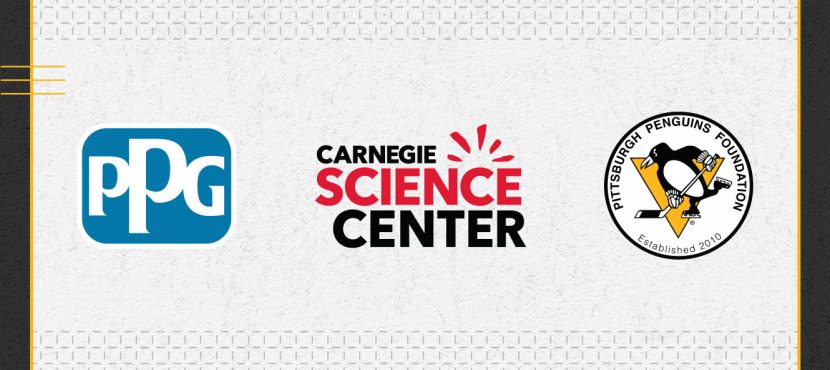PITTSBURGH, March 25, 2021 —The latest assembly show from Carnegie Science Center’s Science on the Road outreach program was developed through a unique partnership with PPG and the Pittsburgh Penguins Foundation that will excite students about STEM programming and careers using sports as the key subject. Science of Hockey invites students to help take a ragtag team of hockey players all the way to the Stanley Cup by learning about reaction time, cryogenic chemistry, forces of motion, and more through dynamic science and math demonstrations. Schools, libraries, and organizations can book Science of Hockey now as a virtual program or bring the assembly to their location this fall.
Science of Hockey explores the physics, geometry, physiology, and materials science behind a game of hockey. Geared toward students in grades K–8, the virtual program includes several live demonstrations led by a Science on the Road educator, with assistance from prerecorded videos of Iceburgh, the official mascot of the Pittsburgh Penguins, demonstrating Newton’s laws of motion, Bernoulli’s principle of lift, and more. Other demonstrations include:
- Immersing a 3D-printed scale model of the Stanley Cup — printed and coated by PPG — in liquid nitrogen, showcasing a dramatic temperature change that demonstrates the science of thermochromism, which occurs when a substance changes color due to a temperature change.
- An explanation of thermochromic paint, created by LCR and PPG, on a hockey puck that fades from bright purple to beige as it warms up, indicating to referees that it is time for a fresh puck.
- Videos of Penguins Director of Youth Hockey Shannon Webster performing the four main types of shots — slap, snap, wristshot, and backhand — to illustrate the physics at play that result in a good pass, reception, or goal.
“Science of Hockey is packed with engaging lessons and demonstrations that draw real-world connections to the scientific concepts students are learning in schools,” said Jason Brown, Henry Buhl, Jr., Director of Carnegie Science Center. “Our collaboration with PPG and Pittsburgh Penguins Foundation has resulted in a fantastic assembly show that is guaranteed to get students excited about science.”
“At PPG, we know that science is all around us – from the paint that protects a hockey goal post, to the coating that indicates when a puck is game-ready – and it is a powerful component in the game of hockey and beyond,” said Malesia Dunn, executive director, PPG Foundation and global social responsibility. “This dynamic and engaging program will allow us to further educate the next generation of inventors, and showcase real-life examples of advanced coatings applications and the chemistry behind them.”
“We are excited to showcase the world of hockey through a new lens with the Science of Hockey program,” said Jim Britt, executive director of the Pittsburgh Penguins Foundation. “Hockey is such a dynamic and face-paced sport; this program perfectly illustrates the many facets of the game. Whether you’re a hockey player, a hockey fan or a lover of science, this program is a thrilling display of the most exciting sport on earth.”
For more information on booking Science of Hockey or other Science on the Road assemblies, visit CarnegieScienceCenter.org/SOR.
PPG: WE PROTECT AND BEAUTIFY THE WORLD™
At PPG (NYSE:PPG), we work every day to develop and deliver the paints, coatings and materials that our customers have trusted for more than 135 years. Through dedication and creativity, we solve our customers’ biggest challenges, collaborating closely to find the right path forward. With headquarters in Pittsburgh, we operate and innovate in more than 70 countries and reported net sales of $13.8 billion in 2020. We serve customers in construction, consumer products, industrial and transportation markets and aftermarkets. To learn more, visit www.ppg.com.
About Carnegie Science Center
Carnegie Science Center is dedicated to inspiring learning and curiosity by connecting science and technology with everyday life. By making science both relevant and fun, the Science Center’s goal is to increase science literacy in the region and motivate young people to seek careers in science and technology. One of the four Carnegie Museums of Pittsburgh, the Science Center is Pittsburgh’s premier science exploration destination, reaching more than 700,000 people annually through its hands-on exhibits, camps, classes, and off-site education programs.
About Carnegie Museums of Pittsburgh
Established in 1895 by Andrew Carnegie, Carnegie Museums of Pittsburgh is a collection of four distinctive museums: Carnegie Museum of Art, Carnegie Museum of Natural History, Carnegie Science Center, and The Andy Warhol Museum. In 2016, the museums reached more than 1.4 million people through exhibitions, educational programs, outreach activities, and special events.








